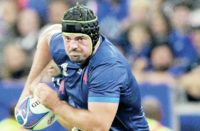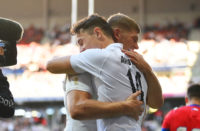 Paul Gustard may not be in quite the same league as Crocodile Dundee when it comes to animal magic, but the Saracens defence coach certainly knows how to get the adrenaline glands of his high-flying squad pumping. Whether it's bringing wild wolves or mouse-eating pythons into the inner sanctum at Allianz Park, Gustard is up for anything that grabs the attention of his players, helping him in his pursuit of making Saracens not only the best club in the land, but the best in Europe.
Paul Gustard may not be in quite the same league as Crocodile Dundee when it comes to animal magic, but the Saracens defence coach certainly knows how to get the adrenaline glands of his high-flying squad pumping. Whether it's bringing wild wolves or mouse-eating pythons into the inner sanctum at Allianz Park, Gustard is up for anything that grabs the attention of his players, helping him in his pursuit of making Saracens not only the best club in the land, but the best in Europe.
With Saracens within reach of their biggest breakthrough, with a Heineken Cup and English Premiership double there for the taking over the next five weeks, Gustard's stock as the architect of the defensive system intrinsic to their winning run has risen sky high. Gustard credits his co-coach, Alex Sanderson, with the python idea, but bringing two wolves along to a training day briefing before their emphatic victory over Ulster in the Heineken Cup quarter-final, put flesh on the bones of a concept he has worked on for four years.
Under the watch of the 37-year-old former Leicester, London Irish and Saracens flanker, the wolfpack mentality has come to the fore, with the Sarries scavengers ripping, tearing, and overwhelming opposition carriers with a savage intensity that underlines why they are the leaders of the Premiership. It is offensive defence incarnate, and it is an indispensable weapon in winning titles.
Many believe that their defence is not the only offensive thing about Saracens – with controversies over the fat lady singing at their new ground before the 80 minutes is over, and the squad's raucous celebrations at Franklin's Gardens on the way to the Premiership title two seasons ago still fresh in Northampton minds – but Gustard says the club has a unique culture which has been decisive in putting them within sight of the big prizes.
“We have used wolves, snakes, frogs, and fire-walking. After the end of season de-brief the players get four weeks off, but for the remaining 11 months we're making coaching presentations to them about three times a week. Much as I think my voice sounds great, I also accept that it could get pretty boring, so we have to find things to focus their attention – and the wolves and snakes do the trick.”
Gustard says that the Saracens squad also benefits from the club's CEO, Ed Griffiths, adopting the principle that too much work and no play makes Jack a dull boy – even to the extent of the players participating in ski-resort activities that most clubs would rule out for fear of injuries.
“This season, after beating Harlequins, we were treated to a trip to Verbier where the boys went tobogganing, snowboarding and paragliding. Previously, we have been to the Oktoberfest in Munich, and camel riding and rallying in Abu Dhabi. It's not the right thing, or the wrong thing – but it's OUR thing.”

Gustard has already reaped a personal reward following Stuart Lancaster's invitation to join the England coaching team for the forthcoming two-Test tour of Argentina, where he will deputise as defence coach for his former Saracens colleague, Andy Farrell, who will be with the Lions.
He says of the first foray into international rugby: “My job is to coach defence in line with what Stuart Lancaster and Andy want. But you also have to give of yourself. It's an emotional sport, and a tough one, so you have to bring your own personality and energy and deliver on the technical side at the same time.”
However, for the moment, Gustard is focused totally on helping Saracens to take the spoils on offer, with a home Premiership play-off semi-final secured already, and Toulon, who they face at Twickenham on Sunday, the only obstacle between the club and its first Heineken Cup final.
“It's the way you go about these things that counts, and that's what I told the players this week. We have got ourselves in a brilliant position – but that's all we've done,” Gustard says.
“Sure, it's about being where we are now in the semi-finals of big competitions, but we want to emulate teams like Leicester, and even surpass them. These opportunities don't come round all the time, so what defines you is taking them, putting down a real marker and making some memories.”
Gustard's inside knowledge of Leicester and London Irish, as well as Saracens, in a career in which he played almost 250 Premiership games for the three clubs, means he has worked with coaches such as Bob Dwyer, Pat Howard, Brendan Venter, Eddie Jones, Allan Gaffney, and, most recently, Farrell.
He maps out his career progression: “I was offered the chance to be a skills coach by Eddie Jones when I retired from playing in 2008, but when Brendan became Saracens director of rugby he asked me to be defence coach. He wanted aggressive line-speed defence, and that's what I did. Andy Farrell was a skills coach first, like me, and then he was our attack coach. I did defence, which is what Andy now does for England.”
He adds: “I'm a good friend of Andrew's. England defend in a very similar way to Saracens, and if I'd moved to England like Andy I would have done the same in terms of importing a system that is effective.”
Given that Gustard brings such energy to his role at Saracens it comes as no surprise when he puts Venter at the top of his list of mentors.
“The biggest influence on me, and probably the best coach, was Brendan. He is incredibly passionate and he created a great environment at London Irish. His attention to detail is immense, and although sometimes he looks like a basket case – and he is as mad as a box of frogs – he is a very caring, loving person. If you combine that with his passion and technical know-how you have a very powerful combination.
“At London Irish we didn't have the biggest squad or budget, or facilities, but he galvanised the club and won them the Powergen Cup, and then he did exactly the same when putting in the foundations at Saracens.
“There are not many people I've come across in life, let alone rugby, who have that passion and drive.”
Passion is a recurrent theme when you talk to Gustard, and it is reflected in the attribute he considers most essential in any Saracens player.
“In a word: Fight. We need competitive people. I ask what he will add to the group and whether his personality will fit in.”
It is competitiveness which is behind the wolfpack concept, with players vieing to be top of the turn-over tackle leaderboard Gustard has introduced.
“As an aspiring young coach I have a real passion for defence, so it would be frivolous not to look at other systems. Our aim is to hit as hard as any team, because you want to emulate the best at all times – and then be better. You can't tell me that anyone tackles harder than Jacques Burger or Brad Barritt. The main difference is that in the southern hemisphere there is more space, and it is more one-on-one, whereas in the northern hemisphere it is more of a gang tackle.”

However, Gustard says that there is nothing restrictive about the Saracens coaching structure, and that his role is multi-dimensional.
“My specific role is defence, and line-outs in attack and defence. But attack and defence are linked in every department. I have to know what Kevin Sorrell wants in attack, what kick-chase our kicking coach Dan Vickers wants, and what Alex Sanderson wants at the breakdown. It's all interchangeable, and at Saracens we like to have an appreciation of all aspects because defence suddenly becomes attack, and the only closed skills are at scrum and lineout.”
“Alex, Kevin Sorrell, Mark McCall and I all speak about the inclusive nature of our coaching system. We talk, live and breathe the game, sharing ideas about selection, coaching, player development, and we are incredibly passionate about our job, and our club. However, we also need outside influences to challenge our ideas. For instance, Clem Booth, the CEO of Allianz, provides mentoring to myself and Alex. We pop in to the City sometimes to see him, and when we had a run of three defeats this season we asked him how he turned the situation of adversity round and got results.”
The chemistry has worked, and there is no sense of Gustard being overawed by Toulon's array of galacticos.
“We believe that we have a strong squad up to 32, but they have got a team behind a team, full of international stars. Jonny (Wilkinson) is still a points machine, and still ferocious in defence. He's a brave
so-and-so even now. However, it's about a match day 23, and we are confident that ours is as strong as anyone's. And I know we will fight for each other however long is required.
“I've been blessed to be able to operate with a group of players who are as good as they are, and have bought into the Saracens culture. It's not me out there making 20 tackles a game, it's Brad Barritt; it's not me winning three turnovers every match, it's Will Fraser.”
“Look at our bench: John Smit is a World Cup-winning 111-cap Springbok captain. We have great strength in our front five, a back row to die for, some of the best half-backs in the country, a wrecking ball centre, and England's No.1 full-back. Rugby is getting faster and harder, with bigger men running at you. The Pacific Islands seem to produce naturally powerful, fantastically gifted, 125kg players, of which Billy Vunipola, who joins us next season, is an example.”
The Saracens wolves are on the hunt, and Gustard's enthusiasm and self-belief gives them teeth.

























